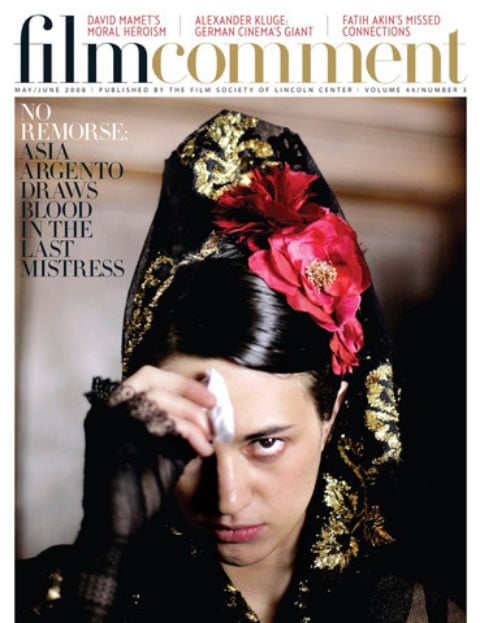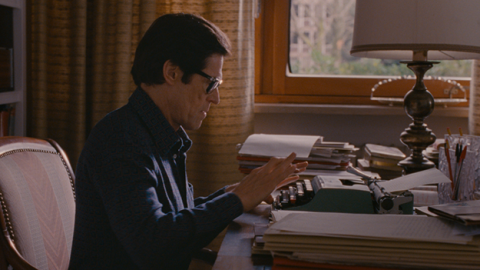
Fatih Akin is a German-Turkish filmmaker from Hamburg. Or rather, he is a German filmmaker with a Turkish name and Turkish parents. His dislike of the hyphenated identity label is such that he was reported as saying, at the time of his first success, Short Sharp Shock (98): “If I can’t be Fatih Akin, I’d prefer to be known as the German Martin Scorsese.”
When Head-On, his fourth feature, was awarded the Golden Bear at the 2004 Berlin Film Festival, and went on to win a dozen more prizes at other festivals, its director had definitely become “Fatih Akin.” A friend and colleague of Tom Tykwer (Run Lola Run), running his own production company (Corazon International), a long-time partner in an indie “creative pool” (Wüste Filmproduktion), as well as a savvy player in the poker games of European Union subsidy schemes and television co-production deals, Akin, at 34, has earned the street credibility of a post-auteur international writer-director-star. Not unlike Lars von Trier, Kim Ki-duk, or Wong Kar Wai, his name may be associated with a national cinema, but he is equally at home in the entrepreneurial (and stylistic) lingua franca of the film festival and art-house circuits.
Yet now that his latest film, The Edge of Heaven, is opening in the U.S., one might be forgiven for thinking Akin had changed his mind, and that his ambition was to be the German—excuse me, Turkish—Rainer Werner Fassbinder. None other than Hanna Schygulla, Fassbinder’s Seventies muse, plays a leading role, as one of two mothers central to the story. The narrative, too, makes more than casual reference to Fassbinder’s films: the narrative setup incorporates echoes of Ali: Fear Eats the Soul, Berlin Alexanderplatz, and The Bitter Tears of Petra von Kant. Just to remove any doubt, in Germany The Edge of Heaven was billed (retroactively) as the second film of a trilogy meant to respond, according to the director, to Fassbinder’s BRD Trilogy (The Marriage of Maria Braun, Lola, Veronika Voss). What the troubled relationship between West Germany and its Nazi past was to Fassbinder, Akin seems to imply, is to him the no less troubled negotiation between “assimilated” Turks in Germany and their homeland.

Ironic? No. Paradoxical? Probably. Full of contradictions? Definitely. Not for Akin the Romeo and Juliet melodramas of multicultural star-crossed lovers or the comedies of mistaken ethnic or national stereotypes found in the “Greek wedding” genre. In both cases, the hyphenation of ethnic or religious identities joins too comfortably or separates too neatly what in reality remain messy sets of generational tensions, universal moral dilemmas, emotional ambivalences, and divided loyalties. Instead, Akin prefers, like Fassbinder, perversely improbable love stories, sadistic scapegoating, and suicidal sacrifices.
As in Head-On and In July (00), Edge of Heaven begins with a scene that has become Akin’s signature situation: a man in a car, going somewhere. Stopping at a gas station, he buys some bottled water and we realize he is in Turkey, near the Black Sea. Cut to a German city (Bremen), where the camera follows an older man as he samples what is on offer in the local red-light district. We get to know Ali (Tuncel Kurtiz) and Yeter (Nursel Köse), he a retired and widowed Gastarbeiter, she a Turkish mother in her forties working as a prostitute to put her daughter (who believes her mother to be employed in a shoe shop) through college back in Istanbul. The young man from the opening scene turns out to be Ali’s son Nejat (Baki Davrak), a professor of German literature in the nearby city of Hamburg. Besides the geographical disorientation of the opening flash-forward (as it proves to be), stark contrasts are being set up, quickly and economically. On one hand, Ali’s older generation of immigrants, homesick but too used to their Bremen neighborhood to do much about it. On the other, Ali’s son, completely integrated and at home in Germany, having successfully made the tricky transition from working-class immigrant housing complex to a life as an intellectual, complete with high-ceilinged, book-lined apartment. But since we have already seen him in Turkey, more Turkish than German, more bohemian than bourgeois, we know this is not quite what it seems.
With equal starkness, Akin sketches the precarious position of the female characters: Yeter in the rented cage of a room where she sees her clients, decked out with blonde hair, red leather outfit, and black thigh-high boots. Without the wig and in street clothes on the tram, accosted by two Turkish Islamists who threaten to cut her up if she continues as a prostitute, she is a middle-aged woman unprotected from her macho zealot compatriots by either the citizens or the laws of her host country. Yet since the segment begins with the title “Yeter’s Death,” her brutal and sudden exit does not come as a surprise—an anticipatory dread hovers over the action, and the pointless absurdity of the event lingers on.

The film’s second part is announced by an equally merciless title: “Lotte’s Death.” In Istanbul, a beautiful young woman, Ayten (Nurgül Yesilçay), is picked up in a police raid, but manages to slip away. A radical Kurdish activist, she escapes to Germany, where she ends up in Hamburg using the name Gul Korkmaz. Without money or contacts, she befriends a female student, Lotte (Patrycia Ziolkowska), who invites her home and offers her bed and board. Lotte’s mother Susanne (Schygulla) warms neither to Gul’s blunt language nor her radical politics, but loves her daughter too much to put a stop to her infatuation with the passionate and fiery guest. When Gul is deported back to Istanbul and promptly jailed, Lotte follows her, and in trying to get her released, unwittingly becomes a go-between for the Kurdish activists.
By then we know that Ayten/Gul is Yeter’s daughter, but the two remain ignorant of each other’s fate. Only we see how very close their (missed) encounter is at one point. (The film’s chance events, overlapping temporal registers, near misses, and providential plotting recall Krzysztof Kieslowski.) The third part, bearing the film’s title as intertitle, sees the surviving characters arrive in Turkey, their quests intersecting without actually converging, keeping to parallel tracks and bringing more near-misses (with the coffins of Yeter and Lotte passing at Istanbul airport as they head in opposite directions). The film’s German title, Auf der anderen Seite, translates literally as “on the other side” (of life, of political and national divides, of self and other). As befits the second part of a trilogy, the end leaves almost everything open, in a manner that suspends these fatally entwined but ultimately quite separate lives, teasing us at once with too little and too much in the way of eventual closure or possible resolution.
The Edge of Heaven won Akin the award for best screenplay at the 2007 Cannes Film Festival. Whether this was a consolation prize for not getting the Palme d’Or, or whether the script did genuinely impress the jury, remains a matter of speculation. The film’s parallels, coincidences, improbabilities, and dramatic ironies are inescapable, and enough to make a Hollywood script doctor tear his hair out. But this being a European film, other rules apply, and furthermore, the dense plotting is in keeping with the genealogy of Sirk-Fassbinder melodrama into which Akin is inscribing himself. Schygulla as the matriarch presides over more than the film’s liberal conscience: she is the guardian of this pledge to continue the generational burden of the German-German-“Hollywood” dialogue (Sirk was German-born), extended now into a German-Turkish-“European” dialogue.

The subtlety of the film’s architecture does not lie in the plot, but has to do with the moral fabric being spun, whose overall design may require a third installment, or at any rate a sequel, to carry the ethical weight claimed by this fable of six interwoven lives. It should be clear from the summary just given that “transgressions” (of whatever kind: sexual, political, ethnic, religious) are punished. But as the action continues to unfold, a willingness to commit acts of sacrifice and self-sacrifice arises in response to those transgressions—not from the perpetrators themselves but rather by way of their stand-ins and substitutes. Ethical choices are made in the name of primary bonds, but the families are incomplete, with someone or something always missing: son and father, but no mother; mother and daughter, but no father; mother and daughter, but no encounter or recognition. If the impression of schematic plotting is unavoidable, it is not for lack of screenwriting skills or lofty ambition. Akin has gone on record about the many rewrites and admitted that even at a very late stage he re-edited large parts of the material, in order to give it a shape that worked.
Let’s assume then, that Akin knows what he’s doing. First, the opening and closing scenes form a temporal bracket and are set during a bayram—a Turkish national holiday that unites secular and religious groups, regardless of their differences. Then there’s the scene in Istanbul placed near the beginning of the third part, but at the heart of the film and its moral fulcrum. Nejat explains to Susanne (the two women framed by an open window) the meaning of the procession of young men coming down the steps outside: they are celebrating the memory of Abraham’s Sacrifice, a story as meaningful to Muslims as it is to Christians and Jews. Tolerance and bridge-building, the virtues of Turkey’s secular constitution, the shared beliefs of the three “religions of the book,” the modernizing prospect of the country’s possible/increasingly doubtful admission to the European Union, the shadow of sharia law on Western democracy—all are closely woven into the destinies of Germans and Turks of the second postwar generation, born, like Akin, in the Seventies and now entering public life, often as artists, musicians, public intellectuals, and academics.
At the same time, Akin leaves no doubt: there is no easy compromise in sight, and a price will have to be paid. When Ayten finally enters a plea bargain with the police to gain her freedom, she is betraying her activist comrades, a step that will surely have dire consequences. Likewise, the ethics of the various acts of sacrifice seem peculiarly New Testament (turning the other cheek, rather than an eye for an eye), based on empathetic identification and a relay of substitution and place-holding. How would this look from the point of view of the Old Law or of Islam, or indeed, how does it square with the harsher lesson in the story of God testing Abraham?
Just as anticipation of death suffuses parts one and two of The Edge of Heaven, at the end we are poised for more dread in the third film of the trilogy, which, after “Love” and “Death” will deal with “Evil” per Akin. More coincidences, fatal choices, ethical dilemmas, and dubious sacrifices? A ratcheting up of suffering and intransigence, of political radicalism and religious hatred? We shall see. Nor do we need to be reminded that 9/11 hijacker Mohamed Atta’s cell worked out of Hamburg, and had contacts to the university where Nejat teaches. The Black Sea, where Nejat is waiting in the last shot, is still calm, but as the fishermen tell him, here you cannot trust the weather.








